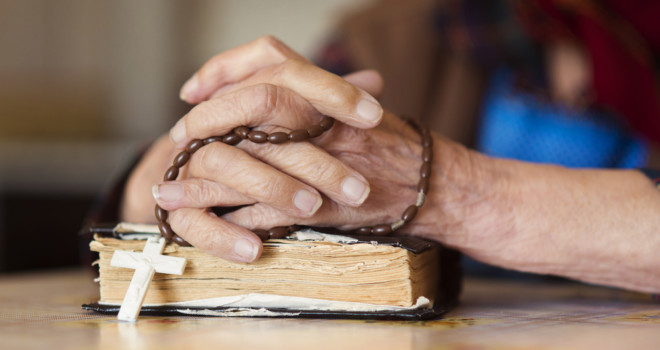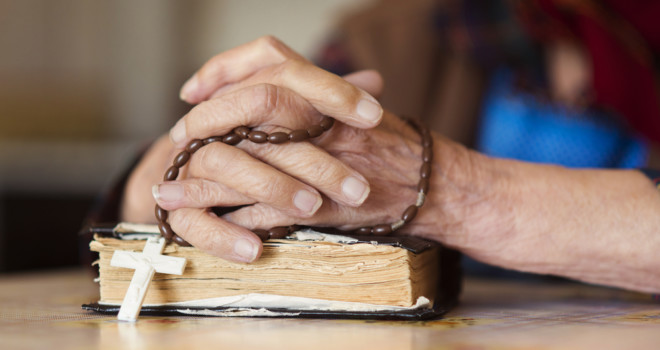One of the realities of the human condition is that our bodies degrade over time and that causes everyone whose life is not cut short by disease and injury to eventually experience physical suffering. This is part of God’s Plan of Providence and serves several useful purposes, even for the people experiencing excruciating, unrelenting pain. The most important of these is that the pain is a vivid reminder that we are mortal and that as much as we dislike the message, we do not control our own destinies. No matter how rich or powerful we are on earth, nothing stops the rampages of time. Some will undoubtedly argue that the wealthy can afford expensive treatments that mitigate the pain, and this is true to a point, but medicine has its limits and no amount of money will ward off death.
In fact, death is a critical part of the universal design. Consider the ramifications if there was no death. In a finite world, every new birth or growth comes at the expense of something else, so if there was no death to provide the raw material, nothing could change. From an even simpler standpoint, the world would quickly become overpopulated if people kept reproducing while no one dies. This actually creates an impossible situation since there would not be enough food for everyone, so people would have to go on living without food. This is obviously unsustainable with material bodies that require food, so without death, life as we know it could not exist without death.
If death is required for the universal plan to work, God needed a plan to communicate this and also to make it more palatable, while at the same time, not making it so enticing that suicide became a desirable option. This is where end of life suffering fits in. Suffering itself is not evil, but is our ability to sense when evil is threatening us. Evil is not an entity that is in opposition to God, but is the absence of goodness like dark is the absence of light. Suffering, then, is our ability to sense that we are lacking some required good. For instance, hunger is our ability to sense that we need food. End of life suffering is our ability to sense when our bodies are breaking down and that death is approaching.
This warning system is useful in a variety of ways. First of all, because it is highly uncomfortable, it makes us understand that living an extended corporal life is both untenable and undesirable. By systematically (in most cases), making the daily routines that we enjoy more and more difficult, it gradually opens us up to the reality that there is a better place. Eventually, daily life becomes so painful and difficult to navigate that we become ready to die and our loved ones, seeing us struggle so mightily, become ready to let us go. In fact, they will see the end of our earthly suffering as a gift of God’s mercy and, although saddened by the loss, they will be more able to accept it.
If the loved one’s sense that the suffering that we go through at end of life is caused by God, they may become angry with Him. This anger is misplaced, however, because they fail to understand that there is no malice in God, only love, and that suffering is not to destroy us but to perfect us. It does this through four tasks that teach us how to love unconditionally, systematically bringing us from sin to salvation if we heed its messages.
The first task of suffering is to build up virtue within us and, thus, teach us proper self-love. This task is accomplished primarily through simple feedback loops.
Life without death would require a different kind of body and indeed, that is a core teaching of Christ and his Church about what awaits us after physical death. Indeed, St. Paul wrote to the Corinthians that we would shed our corruptible, corporal bodies for incorruptible, spiritual bodies at the Resurrection (1Cor 15: 42-44). However, we will not enjoy this incorruptible, spiritual state unless we are in the presence of God, the font of all that is good and true.
Imagine the joy of being able to access all that is good and true in the universe directly from the mind of God, like a supercharged internet with unlimited bandwidth and no downtime. And now imagine knowing it is there but being denied access. That is the choice that is before us. To be with God requires us to be like God, taking on His nature as defined by the Beatitudes. In essence, this requires us to love unconditionally.
So you may be asking yourself what all this has to do with the suffering of the aged. In God’s plan, suffering has four tasks to bring us from sin to salvation, each one focused on teaching us how to love more fully, leaving behind the self-centeredness that drives most sins as we progress. The first task is to teach us to love ourselves and, in this case, that means seeking out ways to resolve our suffering. This drives us to seek healing and provides others with the opportunity to help us, even as we help ourselves. It reinforces our dependency on others and builds up humility. It is also the Church’s experience that very often illness provokes a search for God and a return to Him (CCC. 1501). This is the second task of suffering.
✠












